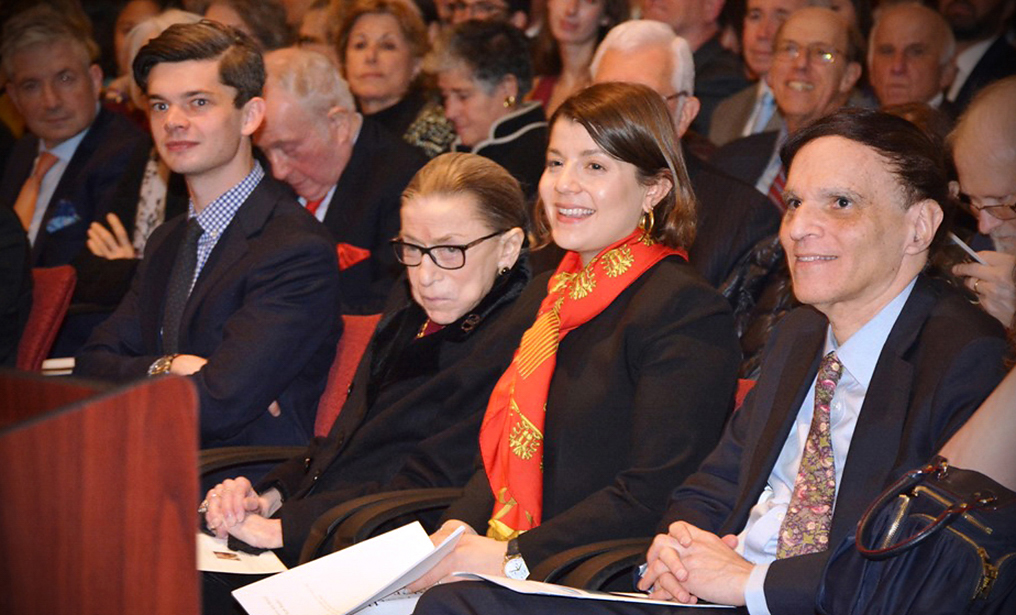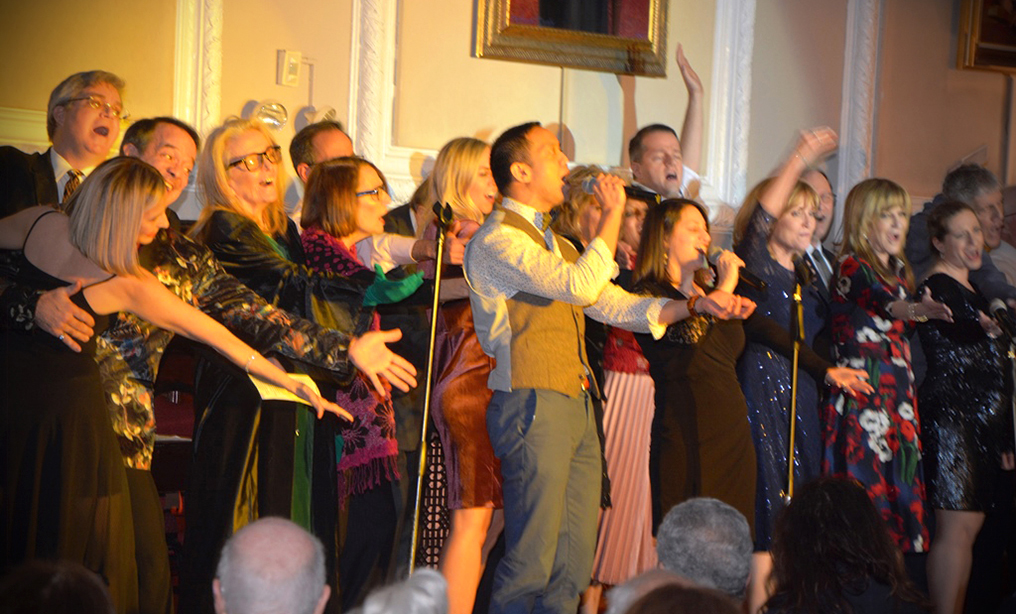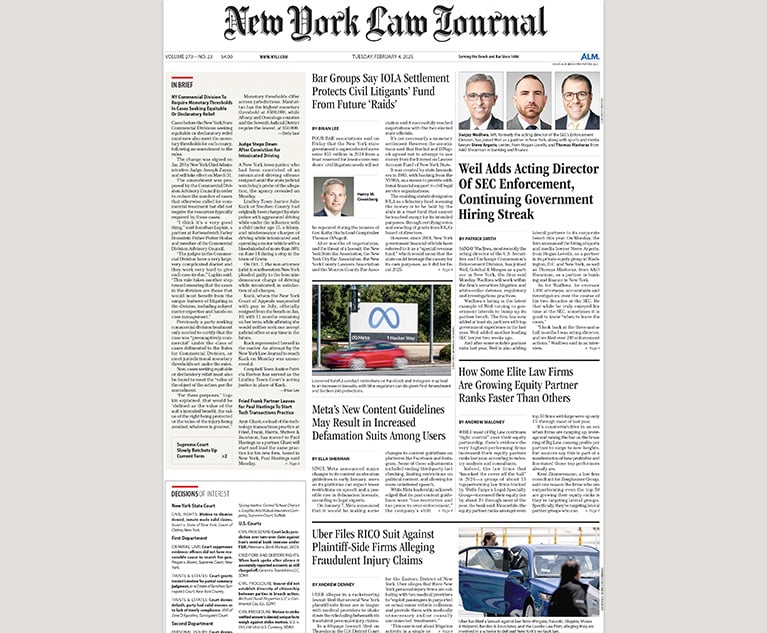RBG's Dissents, Rockstar Status Lauded (and Lampooned) at City Bar Roast
At a show attended by Ruth Bader Ginsburg, a cast of lawyers celebrated the Supreme Court justice's accomplishments and her recent rise to pop-culture stardom.
February 06, 2020 at 02:33 PM
5 minute read
 Justice Ruth Bader Ginsburg sits in the audience at "Quando ce ne sono nove (When There Are Nine): A Night at the Opera with Ruth Bader Ginsburg," at the New York City Bar Association on Wednesday, Feb. 5. She is joined by, from right, Robert Katzmann, Chief Judge of the U.S. Court of Appeals for the Second Circuit, Justice Ginsburg's granddaughter, Clara Spera, and Clara's husband, Rory Boyd. Photo credit: Philip Furgang
Justice Ruth Bader Ginsburg sits in the audience at "Quando ce ne sono nove (When There Are Nine): A Night at the Opera with Ruth Bader Ginsburg," at the New York City Bar Association on Wednesday, Feb. 5. She is joined by, from right, Robert Katzmann, Chief Judge of the U.S. Court of Appeals for the Second Circuit, Justice Ginsburg's granddaughter, Clara Spera, and Clara's husband, Rory Boyd. Photo credit: Philip Furgang
U.S. Supreme Court Justice Ruth Bader Ginsburg—and nine actors portraying her—took center stage at the New York City Bar Association's biannual comedy show Wednesday night.
Drawing from influences as diverse as French composer Georges Bizet and the rapper Biggie Smalls, a cast of lawyers doubled as dancers, opera singers and musicians to put on a show that celebrated the jurist's accomplishments and her recent rise to become a pop-culture icon.
While the actors acknowledged on stage that it could be a bit of a struggle to lampoon a judge who admitted, in brief remarks after the show, that she was "not a very funny person," they made hay out of the judge eschewing traditional roles. For instance, her terrible cooking and her use of male plaintiffs to challenge discriminatory laws while working at the ACLU were both set to music—as was her long friendship with the late Antonin Scalia.
"Read his words and there's genius gleaming / Though he's stuck on original meaning," sang attorney Felicia Berenson-Reinhardt, one of the actresses who portrayed Ginsburg and an associate court attorney in criminal court.
 The cast and crew of "Quando ce ne sono nove (When There Are Nine): A Night at the Opera with Ruth Bader Ginsburg". Photo credit: Philip Furgang
The cast and crew of "Quando ce ne sono nove (When There Are Nine): A Night at the Opera with Ruth Bader Ginsburg". Photo credit: Philip FurgangAnother conservative judge was not treated the same. In one scene, after an exasperated clerk asked Ginsburg how she kept her cool in the face of a right-wing majority, another actress portrayed a somewhat sinister version of the judge—dubbed "Ruthifer"—to hurl taunts and barbed criticism at Justice Samuel Alito while alternating lines with Ginsburg's calm but forceful dissent.
Among the cases that were acted out were United States v. Virginia, where Ginsburg's majority opinion resulted in the end of the men-only policy at the Virginia Military Academy, and Burwell v. Hobby Lobby Stores, where Ginsburg dissented from a ruling that freed Hobby Lobby, whose owners were devout Christians, from having to provide health insurance to their employees that covered contraception.
The judge's more recent rise to political superstardom got a nod, too.
Chief Judge Merrick Garland of the U.S. Court of Appeals for the District of Columbia, portrayed by U.S. Magistrate Judge Stewart Aaron of the Southern District of New York, interrupted Ginsburg's workout (the guards were too busy "doing kegstands" in Justice Brett Kavanaugh's chambers to notice him sneak in, he said) to sing about how she'd become an online icon.
"Everybody ought to be a meme / Children dressing up as you on Halloween," he sang.
Ginsburg's jabots and loud necklaces were also a running joke. When Kevin Schwartz, a partner at Wachtell, Lipton, Rosen & Katz and a onetime Ginsburg clerk, took the stage to defend her from the comedic onslaught, he opened by slipping on a chunky purple necklace and saying, "I dissent!"
The judge's love of opera, despite her inability to sing it, was another recurring theme. The show took musical inspiration from works including "Carmen," "The Marriage of Figaro," "Rigoletto," "Turandot," "La Traviata" and "Gianni Schicchi," according to the program. Schwartz told the story of a burly Supreme Court police officer who moaned to a clerk that he'd seen Madame Butterfly three times while on duty.
Ginsburg herself was seated in the front row. Speaking for just a few minutes at the end of the show, she talked about her history with the New York City Bar Association, whose building previously had just one woman's restroom, and said the show was at "the top of the heap" when it came to the honors she'd received from the organization.
This content has been archived. It is available through our partners, LexisNexis® and Bloomberg Law.
To view this content, please continue to their sites.
Not a Lexis Subscriber?
Subscribe Now
Not a Bloomberg Law Subscriber?
Subscribe Now
NOT FOR REPRINT
© 2025 ALM Global, LLC, All Rights Reserved. Request academic re-use from www.copyright.com. All other uses, submit a request to [email protected]. For more information visit Asset & Logo Licensing.
You Might Like
View All

How Some Elite Law Firms Are Growing Equity Partner Ranks Faster Than Others
4 minute read
Law Firms Expand Scope of Immigration Expertise Amid Blitz of Trump Orders
6 minute readLaw Firms Mentioned
Trending Stories
- 1Roundup Special Master's Report Recommends Lead Counsel Get $0 in Common Benefit Fees
- 2Georgia Justices Urged to Revive Malpractice Suit Against Retired Barnes & Thornburg Atty
- 3How Gibson Dunn Lawyers Helped Assemble the LA FireAid Benefit Concert in 'Extreme' Time Crunch
- 4Lawyer Wears Funny Ears When Criticizing: Still Sued for Defamation
- 5Medical Student's Error Takes Center Stage in High Court 'Agency' Dispute
Who Got The Work
J. Brugh Lower of Gibbons has entered an appearance for industrial equipment supplier Devco Corporation in a pending trademark infringement lawsuit. The suit, accusing the defendant of selling knock-off Graco products, was filed Dec. 18 in New Jersey District Court by Rivkin Radler on behalf of Graco Inc. and Graco Minnesota. The case, assigned to U.S. District Judge Zahid N. Quraishi, is 3:24-cv-11294, Graco Inc. et al v. Devco Corporation.
Who Got The Work
Rebecca Maller-Stein and Kent A. Yalowitz of Arnold & Porter Kaye Scholer have entered their appearances for Hanaco Venture Capital and its executives, Lior Prosor and David Frankel, in a pending securities lawsuit. The action, filed on Dec. 24 in New York Southern District Court by Zell, Aron & Co. on behalf of Goldeneye Advisors, accuses the defendants of negligently and fraudulently managing the plaintiff's $1 million investment. The case, assigned to U.S. District Judge Vernon S. Broderick, is 1:24-cv-09918, Goldeneye Advisors, LLC v. Hanaco Venture Capital, Ltd. et al.
Who Got The Work
Attorneys from A&O Shearman has stepped in as defense counsel for Toronto-Dominion Bank and other defendants in a pending securities class action. The suit, filed Dec. 11 in New York Southern District Court by Bleichmar Fonti & Auld, accuses the defendants of concealing the bank's 'pervasive' deficiencies in regards to its compliance with the Bank Secrecy Act and the quality of its anti-money laundering controls. The case, assigned to U.S. District Judge Arun Subramanian, is 1:24-cv-09445, Gonzalez v. The Toronto-Dominion Bank et al.
Who Got The Work
Crown Castle International, a Pennsylvania company providing shared communications infrastructure, has turned to Luke D. Wolf of Gordon Rees Scully Mansukhani to fend off a pending breach-of-contract lawsuit. The court action, filed Nov. 25 in Michigan Eastern District Court by Hooper Hathaway PC on behalf of The Town Residences LLC, accuses Crown Castle of failing to transfer approximately $30,000 in utility payments from T-Mobile in breach of a roof-top lease and assignment agreement. The case, assigned to U.S. District Judge Susan K. Declercq, is 2:24-cv-13131, The Town Residences LLC v. T-Mobile US, Inc. et al.
Who Got The Work
Wilfred P. Coronato and Daniel M. Schwartz of McCarter & English have stepped in as defense counsel to Electrolux Home Products Inc. in a pending product liability lawsuit. The court action, filed Nov. 26 in New York Eastern District Court by Poulos Lopiccolo PC and Nagel Rice LLP on behalf of David Stern, alleges that the defendant's refrigerators’ drawers and shelving repeatedly break and fall apart within months after purchase. The case, assigned to U.S. District Judge Joan M. Azrack, is 2:24-cv-08204, Stern v. Electrolux Home Products, Inc.
Featured Firms
Law Offices of Gary Martin Hays & Associates, P.C.
(470) 294-1674
Law Offices of Mark E. Salomone
(857) 444-6468
Smith & Hassler
(713) 739-1250







